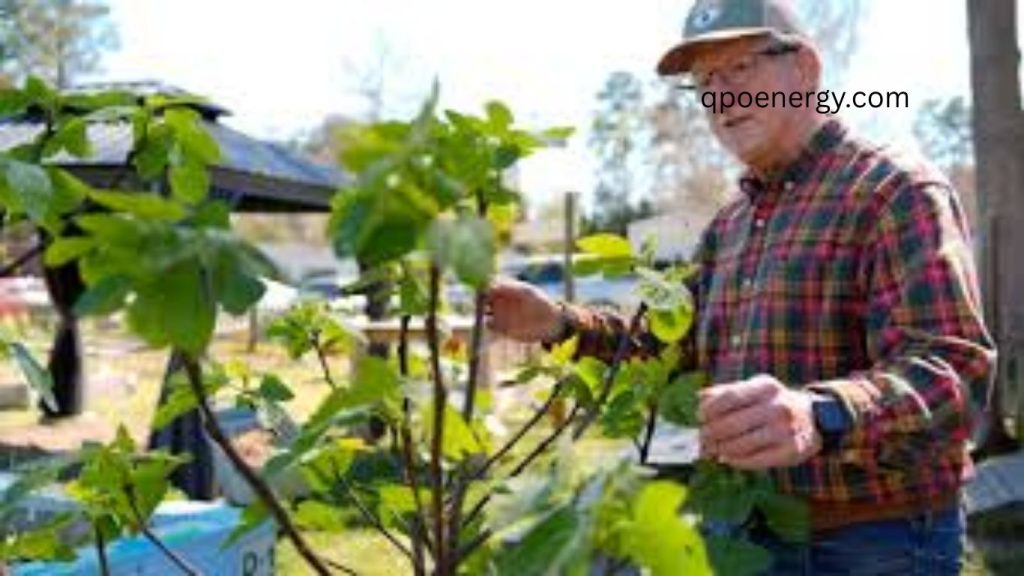Across Athens, Georgia, community gardeners are confronting the unpredictable realities of a warming climate. Seasons that once followed a predictable rhythm now fluctuate, with sudden swings in temperature and erratic rainfall. These changes have disrupted planting schedules, delayed harvests, and made cultivating food increasingly difficult—a challenge with broader implications for food security and social cohesion.
“I can tell a difference,” said Curtis Setterlind, a UGArden volunteer. “The first growth of many plants is happening later in the winter season. Harvesting routines are all backlogged.”
Weather Patterns Create Uncertainty
This year, weather patterns in Athens have been especially unpredictable. A wetter-than-average spring gave way to an inconsistent summer marked by alternating periods of dryness and sudden downpours. “Usually, we plant strawberry cuttings in early spring,” Setterlind explained. “But it was too dry, and we had to delay planting for an entire month.”

For many gardeners, the uncertainty is discouraging. Chloe Yune, a recent UGA graduate and former UGArden Club member, described the challenge: “Gardening used to be really fun for me. Now, the weather’s so erratic, it feels like I’m guessing every day. One week it’s dry, the next everything’s drowning. Every failed harvest is a reminder that the climate is shifting faster than I can adapt.”
Native Plants Struggle
Scientific research backs up their experiences. A University of Georgia study found that native plants, once resilient in the region, are struggling to cope with rising temperatures and changing rainfall patterns. These shifts ripple throughout the gardening ecosystem, affecting what can be grown, when, and how.
“People think it’s just about heat,” Setterlind said. “It’s not only rising temperatures but irregular climate patterns overall. Everything’s interconnected.”
Sustainable Practices and Composting
Despite these challenges, Athens’ community gardens are finding ways to adapt. At UGArden, regenerative and sustainable practices have become central. Composting, once seen as supplementary, is now essential for maintaining soil health—a key buffer against erratic weather. The UGA Office of Sustainability has expanded programs to enhance nutrient recycling and soil resilience across campus gardens.
“Composting is huge,” Setterlind said. “We can reduce waste and reuse nutrients right here, which strengthens the soil and helps crops survive unpredictable conditions.”
Food waste reduction is also a growing focus. According to the USDA, Americans waste an estimated 30–40% of food. On UGA’s campus, innovative pilot programs such as Raccoon Eyes, launched at Joe Frank Harris Dining Commons, track and measure food waste in real time. This data allows administrators to redirect resources efficiently, reducing waste and improving sustainability outcomes.
Collaboration: The Key to Resilience
Yet technology alone cannot solve the problem. “The biggest thing is connection,” Setterlind emphasized. “Many programs have similar goals but operate in isolation. Linking them is the first step toward meaningful change.”
Athens’ gardening community exemplifies this collaborative approach. Local gardens now share seeds, exchange strategies for water retention and pest management, and experiment with crops more suited to shifting climate conditions. Drought-resistant and native plants are increasingly replacing vulnerable varieties, while innovations like drip irrigation and shade cloths protect soil and crops from extreme weather.
Benefits of Community Gardening
Research underscores the value of collaborative gardening. Studies from the National Library of Medicine highlight that community gardening improves physical and mental health, provides nutritious food, and empowers local populations, especially in areas affected by food injustice. Beyond the tangible benefits, these gardens nurture a sense of belonging, cultural connection, and agency, helping communities reclaim control over their food systems.

Inspiration and Purpose
For Setterlind, the work carries a personal mission. “I reject the defeatist mindset. Asking ‘what’s the point?’ is a sad way of looking at things,” he said. He draws inspiration from an old Cree proverb: We don’t inherit the land from our ancestors, we borrow it from our descendants. “This earth isn’t mine; it belongs to people who haven’t been born yet. Every action we take—composting, planting, collaborating—helps secure a future for them.”
This philosophy reflects a broader truth emerging in Athens’ gardens: small, local actions matter. Even as planting calendars, watering routines, and crop selections shift with the climate, the cumulative impact of these practices can transform both the land and the community. Every compost pile turned, every seed swapped, and every new collaboration forged strengthens resilience and promotes sustainability.
Education and Community Engagement
Programs like UGArden show that community gardening can be a powerful tool in responding to climate change. By integrating sustainable practices, encouraging collaboration, and fostering connections across neighborhoods and organizations, Athens’ gardens are cultivating a future where food security, environmental stewardship, and social cohesion coexist.
These initiatives also create educational opportunities. Students and volunteers learn practical skills in regenerative agriculture, soil management, and water conservation while gaining firsthand insight into the effects of climate change on local ecosystems. This hands-on experience benefits not only the gardens themselves but also prepares future leaders to implement sustainable solutions in broader contexts.
Economic and Social Impact
Community gardens also deliver economic benefits. By growing nutrient-rich fruits and vegetables locally, households reduce dependence on commercial supply chains, which are increasingly vulnerable to climate-related disruptions. Gardens also lower food costs and provide meaningful engagement for volunteers, strengthening social bonds within the community.
Infrastructure improvements—like rainwater collection systems and efficient irrigation—help mitigate the effects of unpredictable precipitation. Educational workshops, volunteer programs, and social initiatives foster a sense of shared purpose, ensuring that the benefits of sustainable gardening reach a wide segment of the population.
A Local Response to a Global Challenge
The story of Athens’ gardens underscores a critical lesson: environmental change is not only a global issue but a deeply local one. How communities respond—through adaptive strategies, collaborative networks, and sustainable practices—determines both immediate outcomes and long-term health of ecosystems and society.
Setterlind’s message resonates with gardeners and non-gardeners alike: “Hope isn’t passive. It’s active. Every small effort—turning a compost pile, planting a seed, teaching a neighbor—builds toward a future where the land and the people who rely on it can thrive.”
Growing a Sustainable Future
As Athens’ gardens continue to grow, they demonstrate that even amidst uncertainty, resilience and ingenuity can prevail. The combination of science, community collaboration, and sustainable practices ensures that these green spaces remain productive, educational, and socially enriching. Every harvested crop, composted peel, and shared resource tells a story of adaptation, hope, and environmental stewardship.
Through these efforts, Athens’ gardeners are proving that climate change, while daunting, can inspire innovation and solidarity. By embracing sustainability, nurturing community connections, and acting with foresight, these gardens are sowing more than food—they are cultivating a resilient and hopeful future for generations to come.
Kerwin Cannon is a senior at the University of Georgia, majoring in journalism with a minor in religion and a Certificate in News Literacy.

Frequently Asked Questions:
What is the UGA Community Garden doing to adapt to climate change?
The UGA Community Garden (UGArden) is implementing sustainable and regenerative practices such as composting, water-efficient irrigation, drought-resistant plants, and soil enrichment to maintain productivity despite unpredictable weather patterns.
How does climate change affect gardening in Athens, Georgia?
Changing temperatures, irregular rainfall, and shifting seasons are delaying plant growth, disrupting harvest schedules, and challenging gardeners to adapt planting and watering strategies.
What role does composting play in climate adaptation?
Composting enriches soil with nutrients, improves water retention, and reduces food waste, making gardens more resilient to extreme weather conditions and unpredictable growing seasons.
How does UGArden support the local community?
UGArden provides fresh produce, educational programs, and volunteer opportunities, promoting food security, community connection, and sustainable practices in Athens.
Are native plants affected by climate change?
Yes, many native plants that once thrived in the region are struggling due to rising temperatures and irregular rainfall, prompting gardeners to experiment with drought-resistant and resilient plant varieties.
How does collaboration help community gardens succeed?
Sharing seeds, planting techniques, and sustainability strategies between local gardens strengthens resilience, improves crop success, and fosters a connected gardening community.
What educational opportunities does UGArden offer?
UGArden teaches practical skills in regenerative agriculture, composting, soil management, and water conservation while providing students and volunteers firsthand experience with climate adaptation.
Conclusion
The UGA Community Garden demonstrates that resilience, innovation, and community collaboration can thrive even amid the uncertainties of climate change. By embracing sustainable practices like composting, planting drought-resistant crops, and sharing knowledge across local gardens, UGArden not only ensures food security but also fosters environmental stewardship and social connection. These efforts show that small, deliberate actions at the local level can create meaningful impact—cultivating hope, sustainability, and a healthier future for generations to come. Athens’ gardens remind us that, even in a changing climate, growth is possible when communities work together and adapt with purpose.


